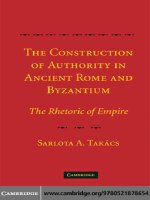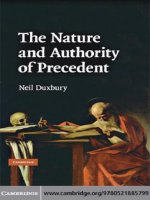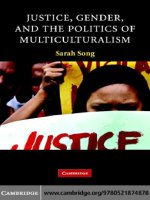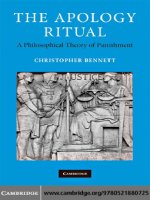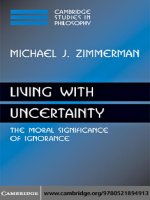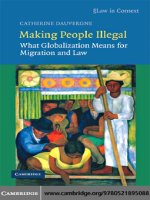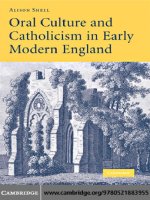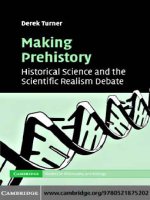cambridge university press dictionaries in early modern europe lexicography and the making of heritage apr 2008 kho tài liệu bách khoa
Bạn đang xem bản rút gọn của tài liệu. Xem và tải ngay bản đầy đủ của tài liệu tại đây (3.59 MB, 408 trang )
DICTIONARIES IN EARLY
M O D E R N E U R O PE
Dictionaries tell stories of many kinds. The history of dictionaries,
of how they were produced, published and used, has much to tell us
about the language and the culture of the past. This monumental
work of scholarship draws on published and archival material to
survey a wide range of dictionaries of western European languages
(including English, German, Latin and Greek) published between
the early sixteenth and mid seventeenth centuries. John Considine
establishes a new and powerful model for the social and intellectual
history of lexicography by examining dictionaries both as imaginative texts and as scholarly instruments. He tells the stories of
national and individual heritage and identity that were created
through the making of dictionaries in the early modern period. Far
from dry, factual collections of words, dictionaries are creative
works, shaping as well as recording early modern culture and
intellectual history.
john considine is Associate Professor of English at the University
of Alberta.
DICTIONARIES IN EARLY
MODERN EUROPE
Lexicography and the Making of Heritage
JO HN CO NSIDINE
CAMBRIDGE UNIVERSITY PRESS
Cambridge, New York, Melbourne, Madrid, Cape Town, Singapore, São Paulo
Cambridge University Press
The Edinburgh Building, Cambridge CB2 8RU, UK
Published in the United States of America by Cambridge University Press, New York
www.cambridge.org
Information on this title: www.cambridge.org/9780521886741
© John Considine 2008
This publication is in copyright. Subject to statutory exception and to the provision of
relevant collective licensing agreements, no reproduction of any part may take place
without the written permission of Cambridge University Press.
First published in print format 2008
ISBN-13 978-0-511-39510-9
eBook (NetLibrary)
ISBN-13 978-0-521-88674-1
hardback
Cambridge University Press has no responsibility for the persistence or accuracy of urls
for external or third-party internet websites referred to in this publication, and does not
guarantee that any content on such websites is, or will remain, accurate or appropriate.
For Sylvia
Contents
Acknowledgements
Conventions and abbreviations
1
page ix
xi
Introduction
1
This heroic and indeed Herculean work: Dictionaries and the heroic
Far more than a mere recording of words: Dictionaries, the heroic
and heritage
The shape of this book
2
The classical heritage I: Philology and lexicography
The labours of Hercules: Lexicography and the classical heritage
at the time of Erasmus
You have remade things which had almost been obliterated: Guillaume
Bude´ and the origins of philological lexicography
Setting forth a hidden treasure: Robert Estienne and the classical heritage
3
The classical heritage II: Henri Estienne and his world
We began to babble in Latin: Henri Estienne and the inheritance
of languages
Emulous of my father’s diligence: Henri and Robert Estienne and
the heritage of scholarly achievement
The riches of Greek: Henri Estienne and the heritage of texts
The expense, and the loss of my youth: Henri Estienne’s dictionary
and the failure of philology
4
Vernacular heritages I: Germany and the Netherlands
1500–1618
The surest proofe of peoples originall: The turn to the post-classical
and the discovery of the Germanic heritage
Our Teutonic language: The earliest study of the vernacular heritage
in German-speaking Europe
Piety and the glorification of the language of the fatherland: The study
of the Germanic vernaculars by Conrad Gessner and Georg Henisch
vii
1
5
17
19
19
31
38
56
56
65
72
86
101
101
113
126
Contents
viii
Restoring its heritage to the fatherland: The Germanic heritage in the
Low Countries
5
Vernacular heritages II: England to circa 1650
A fervent love to my Contrey: The rediscovery of Old English in the
sixteenth century
That large ground of a kinde of Dictionary: The history of English
institutions in the dictionaries of Cowell and Spelman
Our Countrymen (to whome so properly it belongeth): Dutch
and English lexicographers of Old English 1605–1650
6
Vernacular heritages III: England and Scandinavia, circa
1650–1675
A most wise investigator of the antiquities of his fatherland: William
Somner and Old English
The man who restored its ancient languages to the fatherland: The
lexicographical thought of Franciscus Junius
Arameo-Gothic: The Germanic heritage in Denmark and Sweden
7
Post-classical heritages: Du Cange and his world
The middle time: The scholarly discovery of post-classical
Latin and Greek
The customs of our forebears, nearly obliterated and buried in
oblivion: The textual heritage of Charles du Cange
His studies were always directed towards the history of France: Du
Cange and the French heritage
8
Shared heritages: Polyglot and universal dictionaries
Praise the Lord all ye nations: Polyglot dictionaries
Beyond that of any particular Countrey or Nation: Universal dictionaries
The most ancient language: Comparativism and universalism
Conclusion
Afterword
Bibliography
Index
138
156
156
173
188
203
203
216
235
250
250
261
276
288
288
293
306
314
321
323
375
Acknowledgements
The writing of this book was supported by a Standard Research Grant
from the Social Sciences and Humanities Research Council of Canada
(SSHRC), and by generous funding from the University of Alberta. I am
very grateful for both. This funding supported the research assistantships
of Ernst Gerhardt and Peter Midgely, to whom I am indebted, as I am to
Kris Calhoun, Leona Erl and Anna Minarchi for their administrative
support.
I am very greatly indebted to the libraries that have given me access to
their collections: the Kongelige Bibliotek, Copenhagen; the University of
Alberta Libraries, Edmonton; the British Library, London; the Bodleian
Library, Oxford (I owe a particular debt to Alan Carter, Russell Edwards,
William Hodges and Jean-Pierre Mialon of Duke Humfrey’s library); the
Bibliothe`que Nationale and the Bibliothe`que de l’Arsenal, Paris; the
Kungliga Bibliotek, Stockholm; the library of the University of Toronto
and all the other libraries, too numerous to list, that have sent me
material by inter-library loan. I greatly appreciate the courtesy and
patience of their staff. I would also like to express my warm appreciation
of the genius of the architects of the new British Library and of the Black
Diamond building of the Kongelige Bibliotek, Sir Colin St John Wilson
and Schmidt, Hammer & Lassen K/S respectively.
This book is not a reworked thesis, but it had one of its origins in work
on Henri Estienne that I began as a graduate student, and that owed
much to the advice of my supervisor, Robin Robbins, and of Peter Burke,
Anthony Grafton, David Norbrook, Fred Schreiber, Michael Screech and
Nigel Smith. Another point of departure was my experience of work on
the staff of the Oxford English Dictionary, where Philip Durkin, Simon
Hunt, John Simpson and Edmund Weiner helped me to understand how
dictionaries are made. Robert Ireland introduced me to du Cange. I am
very grateful to all of these friends and teachers.
ix
x
Acknowledgements
Earlier versions of some of the material presented here were offered as
conference papers at meetings of the International Association for NeoLatin Studies, the International Society for Historical Lexicography and
Lexicology, and the Rocky Mountain Medieval and Renaissance Association, and as seminar papers at Oxford and Princeton, and I am grateful
to everyone who heard my papers and discussed them with me. At
Cambridge University Press, Linda Bree has given this project years of
patient encouragement, two anonymous readers have offered welcome
criticisms, and Maartje Scheltens has guided me in the last stages of my
work; out of house, J. Bottrill has been a patient and supportive project
manager, and Joanne Hill an ideal copy-editor.
Most important of all has been the love and support of my parents, of
my son Nicholas, and of Sylvia, to whom this book is dedicated.
Conventions and abbreviations
I have, except for some single words and very short passages, given translations or paraphrases of my sources in my main text and originals in my
footnotes. Quotations from vernacular languages are given in old spelling,
preserving i/j and u/v variation but normalizing, e.g., vv in English to w, ‰
in Old English to g. Use of accents, cedillas and other diacritics in vernacular texts has only been normalized in the case of superscript e in
German, which has been replaced by the umlaut. Quotations from Latin
are normalized by the removal of diacritics and the expansion of digraphs;
& is retained for et, and the expansion of other abbreviations is indicated.
Quotations from Greek are normalized by the expansion of all ligatured
and abbreviated forms. Black-letter and Anglo-Saxon typefaces are given in
italics. Underlinings in manuscript are represented by underlinings.
The forms of names are always a problem in the intellectual history of
this period. If in doubt as to whether to cite a given name in vernacular or
classicizing form, I have generally preferred the one that seemed more
familiar to me. (For what it’s worth, my earlier intention was to give
vernacular forms wherever this would not be positively absurd, i.e.,
Melanchthon rather than Schwarzerd but van Gorp rather than Goropius
and Zsa´mboky rather than Sambucus – but as the years went by, this
arrangement seemed increasingly unsatisfactory, and Goropius and
Sambucus, among others, had their learned names restored to them.) I
have given alternative forms of some names in parentheses where they
first appear. Classical Greek names and a few later ones have generally
been Latinized, and a few Greek and Latin names have been Anglicized,
familiarity being the criterion again: Marcus Musurus, not Markos
Mousouros; Aristotle, not Aristoteles. The form of Byzantine Greek
names generally follows the usage of the Oxford dictionary of Byzantium.
References in footnotes are to author and short title, plus date or other
publication details when these are particularly significant or are necessary
to distinguish editions; fuller bibliographical information has been
xi
xii
Conventions and abbreviations
provided in the bibliography. This is divided into three sections:
manuscripts and annotated copies of printed books; printed books
written before 1800; printed books written after 1800. The identifications
of publishers in the imprints of early printed books have been reported in
their original form, since they may convey significant information: ‘ex
officina Roberti Stephani’ in 1536 and ‘ex officina Roberti Stephani
typographi Regii’ in 1543 certainly say different things, as does ‘Oliua
Roberti Stephani’ in 1558, and the form of words ‘excudebat Robertus
Stephanus in sua officina’ in 1538 may also have been selected deliberately.
Although this policy leads to bibliographical records in which the vernacular and classicizing forms of a name both appear, e.g., ‘St Justin
Martyr, Epist[ ola] ad Diognetu[ m], & Oratio ad Graecos. Ed. Henri
Estienne. [Geneva:] excudebat Henricus Stephanus, 1592’, I think this
inconsistency is an acceptable price to pay for the presence of the imprint.
The names of publishing towns have been given in the vernacular, and
Anglicized where appropriate.
Quotations from and references to classical sources generally follow
what I understand to be the modern textus receptus and division into
books, chapters, etc., and particular editions have therefore not been
specified. Translations from classical sources are my own unless otherwise
stated, but owe a general debt to Loeb translations where those have been
available. Translations from post-classical sources and texts in modern
languages are my own unless otherwise stated. Quotations from patristic
sources are accompanied by references to the Patrologia graeca and
Patrologia latina. Quotations from and references to the Bible follow the
New RSV unless otherwise specified.
In citations, facsimile, microfilm and digitized reproductions of early
printed books are not generally distinguished from originals: often the
same edition has been consulted in several different forms at different
times, and identifying them all would not have been particularly useful.
However, where I have discussed an individual copy of a book for the
sake of its annotations and I know it to be available in facsimile or on
microfilm, I have said so; I have also identified locations or facsimiles of
one or two particularly elusive items. I have made particular use of the
reproductions of English books in the microfilm series Early English books
1475–1640, The Thomason Tracts, Early English books 1641–1700, and The
eighteenth century (and of the digitized images of these microfilms available in the databases Early English books online and Eighteenth-century
collections online), and of continental printed books in the IDC microfiche series Philological tools and Harmonia linguarum and in the Gallica
Conventions and abbreviations
xiii
collection which the Bibliothe`que Nationale generously makes freely
available online.
I have tried to disencumber footnotes of the following: (i) gratuitous
identifications of mistakes or omissions in the work of others; (ii) general
bibliographical information, e.g., ‘for a good overview of the subject, see
X, Y and Z’ as opposed to the identification of the sources for the
statements I have made; (iii) references to the standard sources of biographical, bibliographical and lexicographical information, unless these
are actually being quoted directly. Standard sources which I have consulted routinely include the following.
Biographical: for antiquity, the Oxford classical dictionary, 3rd edn, and the Neue
Pauly; for the Byzantine world, the Oxford dictionary of Byzantium; for early
modern writers, Bietenholz and Deutscher’s Contemporaries of Erasmus, Maillard,
Kecskeme´ti and Portalier’s L’Europe des humanistes (xive–xviie sie`cles), and the
Oxford encyclopedia of the Reformation; the Dictionary of scientific biography; the
Biographie nationale and the Nieuw Nederlandsch biografisch woordenboek for
the Low Countries; the Oxford dictionary of national biography for the British Isles;
the extant volumes of the Dizionario biographico degli italiani for Italy; those of the
Neue deutsche Biographie for Germany; the Nouvelle biographie franc¸aise for France;
and the predecessors of all these.
Bibliographical: the English short-title catalogue and the printed volumes of STC
and Wing; the catalogues of libraries in the United Kingdom available online
through COPAC; the printed catalogues of the British Library and the Bibliothe`que Nationale; the Swedish library catalogues available online through
LIBRIS; the Gesamtkatalog der Wiegendrucke; the published volumes of the Index
aureliensis; the National union catalog; the catalogues available online through
OCLC WorldCat.
Lexicographical: the Deutsches Wo¨rterbuch; Liddell and Scott’s Greek lexicon; the
Oxford English Dictionary, 2nd and revised online editions (OED); the Oxford
Latin Dictionary, the Thesaurus linguae latinae, and the standard dictionaries of
patristic and medieval Latin; the Tre´sor de la langue franc¸aise; the Woordenboek
der Nederlandse taal.
I have used the following abbreviations:
ASD
BL
BN
Bodl.
CWE
HCS
Opera omnia Desiderii Erasmi Roterodami
(see bibliography s.n. Erasmus)
British Library, London
Bibliothe`que Nationale, Paris
Bodleian Library, Oxford
Collected Works of Erasmus (see bibliography s.n. Erasmus)
History of classical scholarship (see bibliography s.n. Pfeiffer)
xiii
xiv
LB
LLT
MED
OED
PG
PL
STC
TGL
WNT
Conventions and abbreviations
Desiderii Erasmi Roterodami opera omnia (see bibliography
s.n. Erasmus)
Linguae latinae thesaurus (see bibliography s.n. R. Estienne)
Middle English Dictionary
Oxford English Dictionary online
Patrologia graeca
Patrologia latina
Short-title catalogue, 2nd edn
Thesaurus graecae linguae (see bibliography s.n. H. Estienne)
Woordenboek der Nederlandse taal
chap te r 1
Introduction
this heroic and indeed herculean
work: dictionaries and the heroic
In the 1550s, the son of the best lexicographer in Europe was writing the
introduction to his own first dictionary – a collection, with commentary,
of all the Greek words used in the works of Cicero, which would be
published under the title of Ciceronianum lexicon graecolatinum. His
name was Henri Estienne, and the Latinae linguae thesaurus edited by his
father Robert was the definitive dictionary of the Latin language. Robert
had for some years been working on an enormous dictionary of classical
Greek, and Henri explained that his dictionary of Cicero’s Greek was
intended to make a small contribution to this great undertaking, ‘this
heroic and indeed Herculean work’.1
Nearly two centuries later, another dictionary preface was being written.
This time, the dictionary was of a whole language rather than one writer’s
usage, and of a living language, Irish, rather than a classical one. It was
called The English Irish dictionary in English, the language of its definitions,
and An focloir bearla Gaoidheilge in Irish. The dictionary would be published in Paris, and would be used by the clergy and clerical students of the
Irish College there, and no doubt by those of some or all of the thirty or so
other Irish colleges of continental Europe, whose students would return to
Ireland to serve a people some of whom spoke no English.2 Work had been
done on it by Hugh MacCurtin (Aodh Buı´ Mac Cruitin), hereditary ollave,
or praise-poet, to the chiefs of the clan O’Brien, and author of a celebratory
account of Irish antiquity and an Irish grammar.3 The preface appears to
1
2
3
H. Estienne, Ciceronianum lexicon graecolatinum sig. **3r, ‘in heroico illo ac plane Herculeo opere’.
See Simms, ‘The Irish on the Continent, 1691–1800’ 644–6.
´ Cuı´v, ‘Irish language and literature, 1691–1845’ 394 and 396–7; the books are
For MacCurtin, see O
MacCurtin, Brief discourse in vindication of the antiquity of Ireland and MacCurtin, Elements of the
Irish language, grammatically explained in English.
1
2
Dictionaries in Early Modern Europe
have been by MacCurtin’s senior collaborator, Father Conor O’Begley,
although its argument is reminiscent of MacCurtin’s preface to his
grammar. Its author writes as follows:
That a people so naturally ambitious of Honour and so universally covetous of
Glory, as several generous British Historians have described the Irish to be,
can so strangely neglect cultivating and improving a Language of some Thousands
of Years standing may seem very surprising to all learned Foreigners, and I believe
will do so to the Irish, themselves, when they recover out of their Error, and take
a little time to consider how much they deviate, in this particular, from the
Practice and Policy of their Ancestors, and how inexcusable they are for neglecting
so sacred a Depositary of the Heroick Atchievments of their Country.4
Estienne and O’Begley, far removed as they were in time, had a
number of points in common. They were, for instance, both exiles from
their own countries, the Irishman O’Begley writing in France and the
Parisian Estienne writing in Geneva. They both reinvented their names
to reflect the cultural concerns that also informed their lexicography,
Henri Estienne classicizing to Henricus Stephanus and Conor O’Begley
´ Beaglaoich. They both worked on
Hibernicizing to Conchobhar O
languages which they could speak, but which they perceived to be
undervalued or endangered. And – the point that matters most here –
they both made an association between dictionaries and the heroic.
Estienne saw his father’s work on his dictionary in progress as ‘heroic and
indeed Herculean’. O’Begley saw the dictionary that he and MacCurtin
had made as giving access to language that was a treasury of ‘Heroick
Atchievments’.
The association between dictionaries and the heroic which Estienne
and O’Begley both made is to be found again and again in post-medieval
writings on lexicography. David Garrick boasted in 1755, on the completion of Samuel Johnson’s dictionary of English, which Garrick supposed to be superior to the dictionary of the Acade´mie franc¸aise, that
‘Johnson, well arm’d like a hero of yore Has beat forty French and will
beat forty more’, and these words were much reprinted.5 In the next
century, a correspondent of Joseph Wright’s admired the ‘heroic exertion’
of his work on the English Dialect Dictionary, adding: ‘When I told my
4
5
MacCurtin and O’Begley, English Irish dictionary sigs. ~a2r–v; cf. MacCurtin, Elements of the Irish
language sig. A4r, ‘how strange it seems to the world, that any people should scorn the Language,
wherein the whole treasure of their own Antiquity and profound sciences lie in obscurity’.
Garrick, ‘Talk of war with a Briton’; for printings, see Knapp, Checklist of verse by David Garrick,
item 220.
Introduction
3
wife she said ‘‘I don’t know how he has done it – what a brave man!’’ ’6
The association is a double one: dictionaries have repeatedly been presented as heroic works and their makers have been characterized as heroes.
This is at first sight somewhat counter-intuitive. Dictionary-making is not
a conspicuously heroic business, as I know from personal experience. I took
great pleasure in my work as a full-time lexicographer in the 1990s, but I
certainly, and rightly, had no sense of myself as a heroic figure as I worked. A
visitor to my place of work, one of the greatest lexicographical centres of the
late twentieth century, the main office of the Dictionary Department of
Oxford University Press, might at first glance have mistaken it for one of the
offices of an insurance company. It was, as I remember it, a room in which a
hundred or so men and women sat at desks partitioned off from each other
by low dividers covered in a greyish fabric, busy with data entry or other
paperwork, or making photocopies, or conferring with each other, or eating
sandwiches. The air quality was not very good; there always seemed to be a
telephone ringing somewhere; periodically a hundred or so workstations
bleeped one after the other as a group e-mail circulated. Nor was this, except
with regard to its size, an unusual workspace for dictionary-making. The
dictionary room at the top of Samuel Johnson’s house in eighteenth-century
London, or the sixteenth-century publishers’ officinae in which dictionaries
like Robert Estienne’s Latinae linguae thesaurus were made, appear also to
have been cluttered, busy, unheroic.
Johnson himself summed up the paradoxical relationship between the
lived experience of dictionary-making and the association of dictionaries
with the heroic when, in his own dictionary, he called the lexicographer a
‘harmless drudge’. On the one hand, that sounds like an entirely fair
description. It has been taken at face value. On the other hand, drudgery
was a word that Johnson used to express scornful irony, comparing ‘the
charming Amusement of forming Hypotheses’ with ‘the toilsome
Drudgery of making Observations’ in his life of Boerhaave, writing in the
Plan of a dictionary that ‘the work in which I engaged is generally considered as drudgery for the blind’, commenting sarcastically in the
Adventurer on ‘the low drudgery of collating copies, comparing authorities, digesting dictionaries’, and remarking in the preface to the dictionary itself that Learning and Genius do not bestow so much as a smile
upon ‘the humble drudge that facilitates their progress’.7 Johnson’s
6
7
R. Oliver Heslop, letter to Joseph Wright of 14 June 1895, quoted in E. M. W[right], Life of Joseph
Wright 376.
Samuel Johnson: ‘Life of Dr. Boerhaave’ 115; Plan of a dictionary of the English language 1; The
adventurer 232 (no. 39, for 20 March 1753); Dictionary of the English language sig. A2r.
4
Dictionaries in Early Modern Europe
definition both acknowledges the possibility of seeing lexicographers as
drudges and expects the intelligent reader to see them as something much
more like heroes.
This book originates in an attempt to understand the association
between dictionaries and heroic narratives. Doing that may incur the
reasonable suspicion of practising lexicographers: the response of some of
my former colleagues at the Oxford English Dictionary to the original
sketch from which this book arose was, more or less, that they were
painstakingly engaged in exact and fully documented scholarly research
into language, and that heroic narratives really had nothing to do with
their work. I do not want to denigrate the integrity, accuracy and completeness that characterize the best post-medieval dictionaries. Nor do I
want to underestimate the traditional histories of lexicography that trace
the influence of one dictionary upon another, or describe the minutiae of
dictionary-making. I want instead to propose some new contexts in
intellectual and cultural history for the history of lexicography.
The idea that dictionaries have the sort of imaginative qualities that
characterize poetry or fictional narrative has certainly been proposed
before, albeit rather casually. The novelist and journalist Arnold Bennett
described the Oxford English Dictionary, of which he had been buying
each new part as it was published for forty-odd years, as ‘the longest
sensational serial ever written’. Elizabeth Lea, as she then was, writing to
Joseph Wright before their marriage, told him that the English Dialect
Dictionary was ‘really more poetical than any other work of the age’. Eric
Partridge, writing in his memoir The gentle art of lexicography, recounts
the doubtless apocryphal story of the old lady who, having borrowed a
dictionary from the library under the misapprehension that it was a novel,
remarked on returning it that it was ‘A very unusual book indeed – but
the stories are extremely short, aren’t they?’8
I want to respond to perceptions like these of dictionaries as narrative
or poetic or indeed sensational, and to argue that, notwithstanding the
misgivings of my former colleagues, many dictionaries can be read as, to
some extent, works of the imagination, and as presences in the imaginative lives of their readers. Rather than documenting early modern
lexicographers’ debt to the dictionaries of the Middle Ages, for instance, I
want to look at the place of early modern dictionaries in the imaginations
8
Arnold Bennett, ‘Books and persons’ column in the Evening Standard, 5 January 1928, reprinted in
Mylett, Arnold Bennett: The Evening Standard years 115; Elizabeth Lea, letter of 17 June 1896, in
Wright, Life of Joseph Wright 230; Partridge, Gentle art of lexicography 14.
Introduction
5
of their makers and readers. I want to ask why lexicography was a heroic
matter to a number of its practitioners. I want, in other words, to think
about the kinds of anxiety and pride and imagination and love that
inform dictionaries.
far more than a mere recording of
words: dictionaries, the heroic and heritage
One way to begin to address the questions about the social and cultural
history of dictionaries outlined above is to examine the possibility that
Estienne and O’Begley were both saying something interesting and
profound about lexicography when they associated it with the words
heroicus and heroic. The argument of this section is that they were. On the
one hand, dictionaries have much in common with those kinds of writing
which are more usually called heroic, or which take the heroic as their
subject. This is O’Begley’s point: the dictionary orders a treasury of
heroic achievements. On the other hand, the makers of dictionaries are
often seen as heroic figures. This is Estienne’s point: the dictionary-maker
is a hero, another Hercules.
Neither Estienne nor Begley meant to call lexicography heroic in the
sense ‘courageous’. This has been done. Just as the correspondent of
Joseph Wright’s who referred to his ‘heroic exertions’ went on to say that
he had been described as ‘brave’, other admirers of Wright’s referred to
his ‘courage’ and ‘pluck’.9 Other examples could no doubt be adduced.
The idea that lexicography calls for a kind of moral courage is, however,
vague. Its weakness becomes apparent when a statement like the following
is considered: ‘Indeed linguists afford some notable examples of heroism
if heroism may be said to include pioneering sometimes in perilous
isolation and under risk of derision. Henry Sweet and the Grimm
brothers were perhaps heroes in this sense, and the Russian linguists who
fell foul of Stalin.’10 This is true, but it is too general to be of interest.
Although linguists, and among them lexicographers, have certainly been
known to show great moral courage, so have the members of many other
professions: that point does not make a specific association between
dictionaries and the heroic. What Estienne and Begley meant starts to
become clearer when some instances of the Latin word heroicus which
Estienne applied to his father’s work are examined.
9
10
Wright, Life of Joseph Wright 377 (quoting a letter of the early 1890s from an unnamed American),
394 (quoting a letter of 11 January 1896 from F. J. Furnivall).
Williams, ‘George Borrow: The word-master as hero’ 117.
6
Dictionaries in Early Modern Europe
The earliest extant occurrences of heroicus are in Cicero, who referred
in De natura deorum to the wicked Medea and Atreus as heroicae personae,
‘characters of heroic legend’. A little earlier in the same book, Cicero had
written that one of the several solar deities known to the learned was said
to have been born at Rhodes heroicis temporibus ‘in the heroic period’.11
He was here evidently not using heroicus in the sense that heroic has in
modern English: he had no intention of associating either a dubious solar
deity or two of the villains of Greek myth with courage. His point was
that they could be located in a distant time, in which a number of
exemplary and foundational stories, often peopled by larger-than-life
characters, were set. Ulysses and Nestor had, Cicero said elsewhere, lived
in that time: they were wise men heroicis aetatibus ‘in the heroic age’.12
One of the greatest early modern philologists, Joseph Scaliger, likewise
suggested that the period at the beginning of Greek history, the records of
which mixed historical and legendary material together, should be called
heroicum rather than mythicon.13 That same distant time is called heroic in
early uses of the word in other languages. For instance, the first occurrence of Italian ero`ico documented in the Grande dizionario italiano is a
reference to the ‘eroici tempi’ in which meritorious persons such as
Codrus, Cyrus or Charlemagne came to be venerated as heroes.14 Similarly, the first occurrence of heroic in any variety of English is, according
to the Oxford English Dictionary, in the dedication of a political text called
The complaynt of Scotland, written in Middle Scots in 1549. Addressing
Mary of Lorraine, widow of James V, the author said that
your heroic virtue is more to be admired than was that of Valeria, the daughter
of the prudent consul Publicola, or of Cloelia, Lucrece, Penelope, Cornelia,
Semiramis, Tomyris, Penthesilea, or of any other virtuous lady whom Plutarch
or Boccaccio has described.15
Here, heroic describes a kind of virtue manifested in ancient narratives,
which, in an early modern high culture that traced many of its institutions to the ancient world, were to some extent foundational narratives
11
13
14
15
Cicero, De natura deorum 3.71 and 3.54. 12 Cicero, Disputationes tusculanae 5.7.
Scaliger, Thesaurus temporum (1606), quoted and discussed Grafton, ‘Tradition and technique’ 26.
Davanzati, ‘Orazione in morte del granduca Cosimo primo’ (1574) in Opere II:463, ‘Cosı`
naturalmente ancora si facevano i re di quegli eroici tempi, quando i popoli eleggevano
spontaneamente colui che gli avanzasse di meriti o di virtu` sue o de’suoi maggiori, come fu Codro
in Grecia, Ciro in Persia e poi Carlo in Francia.’
Wedderburn [?], Complaynt of Scotland 1, ‘3our heroyque vertu, is of mair admiratione, nor vas of
valeria the dochtir of the prudent consul publicola or of cloelia, lucresia, penolope, cornelia,
semiramis, thomaris, penthasillie, or of ony vthir verteouse lady that plutarque or bocchas hes
discriuit.’
Introduction
7
for that culture. But heroic virtue is not, for the author of the Complaynt,
confined to the remote world of antiquity; it can be re-enacted now, and
in this case its present enactment even surpasses the past. Similarly, in
Shakespeare’s The first part of Henry the Sixt, there is a reference to the
‘Heroick Lyne’ of the sons of Edward III of England and their progeny.16
Here, as in the Scots example, the heroic belongs in the past – the word
describes the ancestors of men living in the time of the play – but also in
the present as descended from that past, for the heroic line still flourishes,
embodied in its living representatives. The heroic world is that past world
on which the present is founded, and which informs or is re-embodied or
emulated by the present.
This helps to explain what Conor O’Begley meant by ‘Heroick Atchievements’, and to suggest why there really is an important association
between lexicography and the heroic. Begley’s argument was that language
makes a link between the present and the foundational past of any culture,
the past to which its larger-than-life predecessors belong, the heroic past. Its
distance from the observer may vary greatly, from the gulf of time between
Cicero’s contemporaries and the solar deity born in the heroic age to the
century or so between the lifetimes of Edward III and Henry VI. What
defines it is not this distance but its difference from the present, and its
place in the cultural ancestry of the present. The people of the heroic age
are the forerunners of the living, its institutions are the forerunners of living
institutions and its language is connected with living language.
The connection between the living and the heroic age is one of
inheritance or heritage. Inheritance may be a matter of literal genealogical
descent from a heroic person or family, for instance the descent from
Edward III which is so important in Shakespeare’s history tetralogies, or
the descent from Trojan colonists which was so widely claimed in Europe
in the medieval and early modern periods. A theme that will recur in this
book is the relationship between lexicography and family background, as
in the cases of Robert Estienne, his son Henri and Henri’s grandson
Meric Casaubon – or as in that of the new edition of Francis Holyoake’s
Latin–English dictionary by his son Thomas, ‘heir not only to the legal
rights and material inheritance of his father, but to his industry and
erudition’, and indeed heir to the dictionary too, ‘which his dying father
gave to him as one of his charges’.17 Another, related to it, is the sense that
16
17
Shakespeare, First part of Henry the Sixt in Works sc. 13 (ii. v in other editions), TLN 1031.
Thomas Barlow, epistle ‘lectori benevolo’ in Holyoake, Large dictionary sig. A2r, ‘non tantum juris
ac patrimonii, sed industriae ac eruditionis paternae haeres’ and sig. A2v, ‘Lexicon a Parente
editum (quod etiam in mandatis sui dedit moriens pater)’.
Dictionaries in Early Modern Europe
8
the lexicographical work of one generation is inherited from the one
before it. A number of early modern dictionaries can be surveyed together
as links in a chain of inheritance, as in the case of the first wordlists of
Old English: from Laurence Nowell to John Joscelyn, from Joscelyn to
Sir Simonds D’Ewes, from D’Ewes to William Somner and into the web
of filiations from one seventeenth-century antiquary to the next.18 A third
theme, related to the previous two, is the relationship between lexicography and material inheritance, particularly the inheritance of land, as in
the cases of Sir Simonds D’Ewes and of Sir Henry Spelman and his heirs.
Finally, although dictionaries are not autobiographies (the claim has,
incidentally, been made by Anthony Burgess with reference to Johnson’s
Dictionary), one of the stories to which the lexicographer can hardly help
alluding, more or less fully and explicitly, is that of his or her own life.19
The lexicographer becomes part of the story that she or he tells, and thus
becomes not only the transmitter of a heroic heritage but heroic in his or
her own right. The same may of course be said of other scholars
who recover ancient texts: for instance, a student of the literary historian
W. P. Ker wrote: ‘We came to look upon Ker as an epic hero . . . whose
unfaltering guidance led us and allowed us to share in the voyage to the
enchanted places of the mind.’20
The word heritage calls for further consideration. It unites the themes of
this book very helpfully, but, by using it, I do not want to claim that this
book makes a specialized contribution to the academic discipline called
‘heritage studies’. I want to use the word flexibly and non-technically, in
the range of senses suggested by, for instance, its excellent definition in the
Canadian Oxford Dictionary: ‘things such as works of art, cultural
achievements and folklore that have been passed on from earlier generations; a nation’s buildings, monuments, countryside, etc., esp. when
regarded as worthy of preservation; . . . that which is or may be inherited;
inherited circumstances, benefits, etc.’ The distinction between heritage and
history in David Lowenthal’s The heritage crusade and the spoils of history is
stimulating. Lowenthal’s argument there is that heritage is not simply a
name for the cultural monuments of a nation or a people; it is, rather, the
product of a particular kind of creative relationship with the past:
heritage is not an inquiry into the past but a celebration of it, not an effort to know
what actually happened but a profession of faith in a past tailored to present-day
18
19
20
For antiquaries’ filiations, see Parry, Trophies of time 6.
Burgess, ‘The OED Man’ 1094, answered by Walker, ‘Johnson’s Dictionary’.
Quoted in [MacCunn and MacCunn], Recollections of W. P. Ker 30.
Introduction
9
purposes . . . The historian, however blinkered and presentist and self-deceived,
seeks to convey a past consensually known, open to inspection and proof, continually revised and eroded as time and hindsight outdate its truths. The heritage
fashioner, however historically scrupulous, seeks to design a past that will fix the
identity and enhance the well-being of some chosen individual or folk.21
In so far as a heroic age is an age in which the foundational myths of a
culture are located, it is also an age in which the heritage claimed by a
culture is seen as having its wellspring. The heroic achievements of the
Irish people which O’Begley saw as stored up in their language are the
heritage of speakers of Irish. Once a heritage has been identified, it may
help to unite the people who lay claim to it, and there is therefore a sense
in which questions of heritage and questions of community bear reciprocally on each other. The ‘spurious past’ concocted by ancient Greeks
as they reflected on ‘fossils and landscape . . . ruins and relics’ is discussed
by Sir John Boardman in his Archaeology of nostalgia, with the conclusion
that it ‘played an important part in the Greeks’ own creation of national
identity and pride’.22
Dictionaries have sometimes been records of the emerging sense of
identity of particular speech-communities or reading communities,
groups defined by use of a common spoken language or by commitment
to the study of a common body of texts. These communities are often illdefined, and an individual may belong to more than one.23 By no means
are they always nations, and this is not a book about nationalism: the
members of a speech-community may constitute a nation, but they may
also spread over several nations, or be a minority in one nation, or both.
The members of a reading community – the Latin-reading commonwealth of the learned, for instance – may have quite a strong sense of
collective identity while remaining physically scattered. One particular
kind of reading community which will appear from time to time in this
book is the group of people who work together, in one place or as a
network of correspondents, to make a dictionary. So, for example, James
Murray remarked in his presidential address to the Philological Society in
1880 that readers from the United States had contributed very helpfully to
the project that would become the Oxford English Dictionary, and went
on to say ‘that I find in Americans an ideal love for the English language
as a glorious heritage, and a pride in being intimate with its grand
memories, such as one does sometimes find in a classical scholar in regard
21
23
Lowenthal, Heritage crusade x–xi. 22 Boardman, Archaeology of nostalgia 190–1.
See Burke, Languages and communities 5–6.
10
Dictionaries in Early Modern Europe
to Greek, but which is rare indeed in Englishmen towards their own
tongue’.24 In such a case, the dictionary may help to define two communities, that of its contributors and the larger one whose language it
documents.
The consideration of heritage and community in linguistic terms
is important. Certain objects, including buildings, and certain places
are indeed tangible embodiments of heritage, an important theme of
Lowenthal’s book.25 But objects and even places are vulnerable to time
and fortune, in a way in which less tangible items of cultural heritage are
not. Names may outlast the things named, and songs may outlast their
subjects; moreover, words and tunes are portable. So, a concern with
heritage that leads to the valorization of certain places and antiquities and
to the collection of culturally significant objects may also lead to the
valorization and collection of words, music, traditional knowledge and
other intangibles. ‘Folklore,’ as Lowenthal reflects, ‘the authentic voice of
unlettered ancestors, became a prime facet of 19th-century patrimony,
folksong an agent of chauvinism.’26 There, the word authentic is charged
with irony: the oral and customary traditions covered by the term folklore
are not always as immemorial as those who value them like to believe.
Traditions may be invented, as in the cases discussed in Eric Hobsbawm
and Terence Ranger’s famous collection The invention of tradition; the
dividing line between ‘oral’ and ‘literate’ culture, between folklore and
learning, is permeable.27
The collection of information about heritage might, in early modern
Europe, belong to aristocratic culture, as in the case of the collection of
genealogical information, an enterprise in which tradition was often
manufactured by venal heralds and eager clients.28 An interest in heraldry
might be accompanied by an interest in lexicography, as in the cases of Sir
Henry Spelman and Charles du Cange. Legal history might likewise be
directed primarily to questions of landholding, a matter of most interest
to the landholding classes. But it might also lead to a discovery of popular
heritage, for customary law such as the common law of England or that
of the pays de coutumes of early modern France was regarded as by definition the creation of the people rather than of nameable legislators;
J. G. A. Pocock remarks of it in his classic The ancient constitution and the
24
26
27
28
Murray, ‘Ninth annual address’ 123. 25 Cf. also Boardman, Archaeology of nostalgia 45–126.
Lowenthal, Heritage crusade 63.
On oral and literate cultures, see esp. Fox, Oral and literate culture in England, 1500–1700.
See, e.g., the examples in Edelman, Attitudes of seventeenth-century France toward the Middle Ages
51–3, and cf. Lowenthal, Heritage crusade ad indicem s.v. genealogy.
